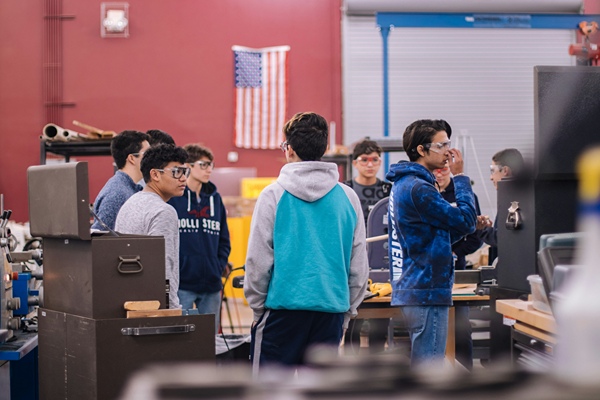Tech-Savvy Teens: Preparing for Jobs in a Digital World
As teens approach graduation and prepare for jobs in the digital world, it’s crucial to understand the importance of career readiness. This phase is a significant stepping stone that can shape their professional future. Having a plan and being prepared can make all the difference whether they seek their first job or internship.
For parents and educators, guiding teens through this process helps them navigate challenges and sets them up for long-term success.
Job Application Essentials
When applying for jobs or internships, having the right tools can elevate a teenager’s chances of standing out. Start with the essentials: crafting tailored resumes and cover letters. Resumes should reflect their unique skills, experiences, and aspirations. Encourage teens to personalize their resumes for each job application, highlighting relevant experiences and skills that match the job description.
A professional online presence helps emphasize skills as well as personality. LinkedIn can connect them with potential employers and mentors. Encourage them to update their profiles with their latest achievements, internships, or volunteer work. This experience will guarantee a positive first impression.
Gaining Experience
One of the best ways for teens to prepare for their careers is through gaining practical experience. Internships and part-time jobs provide invaluable learning opportunities that enhance their resumes and skill sets. According to research from the National Association of Colleges and Employers (NACE), 50.3% of employers extend full-time job offers to interns. This statistic underscores the importance of internships as a launching pad into the job market.
But it’s not just about paid positions. Volunteering can also be an excellent way to gain experience. It allows teens to develop new skills, meet people in their desired fields, and demonstrate their commitment and work ethic. Volunteering often provides experiences that can be discussed in interviews, showcasing their initiative and willingness to contribute to a cause.
Building Transferable Skills
As teens venture into the workforce, they should focus on developing transferable skills applicable to any job. Employers highly seek out key skills in communication, problem-solving, and teamwork. skills
Encourage teens to seek out opportunities to develop these skills in real-world settings. Group projects at school, sports teams, or community activities provide platforms for honing these essential abilities. Additionally, participating in clubs or organizations can help them enhance their leadership skills and learn to work effectively with diverse groups of people.
Lifelong Learning
The importance of lifelong learning cannot be overstated, both for personal development and career planning. The ability to adapt and continuously educate oneself is crucial for career advancement. As technology evolves and industries change, keeping up with new trends and skills is essential.
Adaptability has become critical for professionals across various fields, requiring them to update their skill sets continuously to stay relevant. Embracing technology and exploring diverse learning methods—from online courses to interactive webinars—enables teens to cultivate critical skills in high demand.
This commitment to education enhances problem-solving and innovation abilities and fosters a mindset of resilience and growth. By prioritizing lifelong learning, teens and young professionals can better navigate career transitions and seize new opportunities, ensuring they remain competitive and prepared for the challenges of the digital age.

Leveraging Technology
Teens should familiarize themselves with tools and resources to enhance their career skills. This could range from learning specific software related to their field of interest to understanding social media marketing. If they’re looking to land a job in IT, for example, they should learn programming languages, cloud computing, networking, and cybersecurity.
Encourage them to use online learning platforms, webinars, and other resources that can provide valuable insights and knowledge. The more they can leverage technology, the better prepared they will be for modern workplaces. Companies also demand that their new employees posses a strong awareness of internet safety to protect company data and assets.
Networking and Interviewing
Networking is a crucial component of career readiness. Teens should be taught the importance of building connections with peers, mentors, and professionals in their desired fields. Encourage them to attend career fairs, workshops, or networking events where they can meet industry professionals and learn from their experiences.
Preparation is the key to success in any job interview. When applying for their first job or internship, practicing commonly asked questions and refining their responses can build confidence and help them perform better in actual interviews. Don’t forget the importance of a tailored resume, cover letter, online presence, networking, and interview skills.
Conclusion
Preparing for a career is the foundation for future success. By focusing on job application essentials, gaining experience, building transferable skills, embracing lifelong learning, leveraging technology, and honing networking and interviewing skills, teens can set themselves up for a bright future.
Parents and educators are vital in guiding teens through this process, helping them gain the confidence and skills they need to thrive in the workforce. With the proper preparation, teens can navigate the job market successfully, opening doors to exciting opportunities and a fulfilling career.
About the Author
 Katie Brenneman is a passionate writer specializing in education, mental health, family lifestyle and online safety. When she isn’t writing, you can find her with her nose buried in a book or hiking with her dog, Charlie. You can follow her on Twitter.
Katie Brenneman is a passionate writer specializing in education, mental health, family lifestyle and online safety. When she isn’t writing, you can find her with her nose buried in a book or hiking with her dog, Charlie. You can follow her on Twitter.




